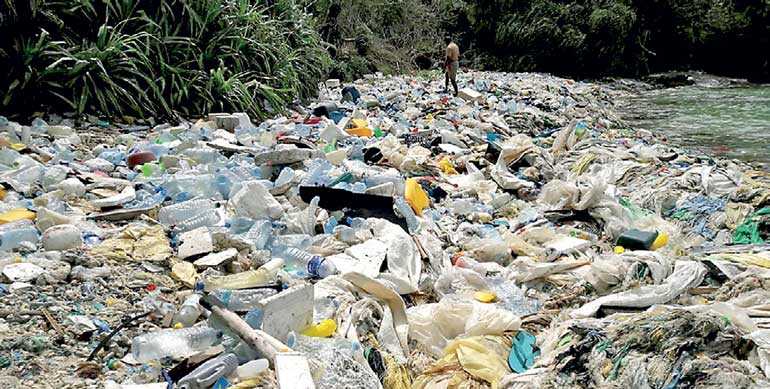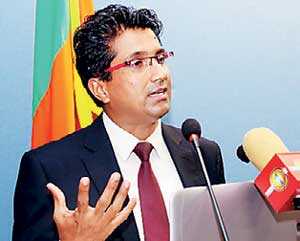Saturday Feb 21, 2026
Saturday Feb 21, 2026
Tuesday, 16 October 2018 00:47 - - {{hitsCtrl.values.hits}}

By Ruwanthi Jayasekara
A round table discussion on ‘Marine Environment Pollution in Sri Lanka’ was organised by the Institute of National Security Studies Sri Lanka (INSSSL) on 11 October, where Ministry of Environment and Renewable Energy Marine Environment Protection Authority (MEPA) General Manager Dr. Terney Pradeep Kumara highlighted the gravity of marine pollution in Sri Lanka. 
“If Kenya banned plastic bags in one night and Rwanda followed it, why not Sri Lanka? We need to change the existing norms and culture in our society to instil values to protect our marine environment, if we don’t our future generations will have to face the consequence,” said Dr. Kumara.
The discussion was moderated by INSSSL Director General Asanga Abeyagoonasekera and the event was attended by scholars, distinguished military officers, Police officers and many academics and researchers.
Delivering the opening remarks Abeyagoonasekera appreciated President Maithripala Sirisena for declaring a Marine Protection Week and his commitment towards protection of marine environment which was spelled out in the Presidents Expert committee report on sustainability 2030 Agenda released recently.
Dr. Kumara’s insights were significant. There are five large gyres: whirlpools of water trapping huge collection of trash in their currents, which would not allow any animal to live in the specific area. The ocean is the largest carbon sink, a source of protection on which more than one billion people depend, a source of energy, medicine and mineral, etc. The question lies as to why Sri Lankans have not yet comprehended the importance of marine protection and how Sri Lanka became the fifth in Worst Plastic Offenders in 2015 according to Climate Desk.
Dr. Kumara mentioned that 80% of tourists left Mirissa in one night due to bad odour and pollution. The beautiful beaches in Trincomalee, Mirissa, Kudawella and Mannar are no longer so, with plastic moving on the waves, oil spills and dumped solid waste and chemicals. “Going for a swim in Mt. Lavinia today is like taking a bath in a sewage pit.”
He further noted that Japan treats more than 90% of raw sewage whereas Sri Lanka treats only 2% of it. As a result, the entirety of Sri Lanka impacts harmfully on coral reefs, sea grass beds, deep sea, beaches, lagoons and estuaries.
Action has already been taken under the Marine Pollution Environment Act No. 35 of 2008, including the creation of Beach Parks, the ban on polythene products such as High Density Polythene and further goals are set for Sri Lanka to become ‘Pollution-free’ by 2030. Yet there is a grave concern that this cannot be realistically achieved.
According to Dr. Kumara, the use of dynamite by fisherman poses threats and makes marine animals vulnerable. He said: “Dynamiting a reef is like dynamiting a kindergarten. You dynamite the future.”
While sharing a picture with the audience photographed two weeks ago which depicted the state of pollution in Kudawella Fishery Harbour, Dr. Turney warned about the negligence of authorities of their duty to keep the harbour premises clean. The main issue lies in the implementation of policies and legal action.
Dr. Kumara further noted, “People are not willing to change the education system to teach children how to protect the environment and gradually create an environmental friendly mindset. Throwing the bus ticket has become a tradition and a culture and going out of it seems going out of the culture.”
We have limitations even when taking actions against oil spills which we have to admit. During the discussion, it was suggested to have a higher fine than the existing penalty of Rs. 5,000, and compulsory community service to the offenders to be implemented, as the polluter has to pay for their actions.
Dr. Kumara recommended the 6R concept of (Recycle, Reuse, Reduce, Refuse, Rethink, Repair) and the promotion of ‘zero-plastic houses’ would be a solution. Out of many initiatives taken by MEPA banning of single use plastics, promoting glass bottles, beach parks, coastal schools plastic free zones and Lassana Gama (beautiful village) are among them.
It was concluded that all citizens of Sri Lanka should contribute at an individual level and there is a responsibility to coordinate and bring all stakeholders to forums such as this is of national importance and INSSSL the national security think tank’s role of brining environment security to the forefront is commendable.
(The writer is a Research Assistant at INSSSL.)